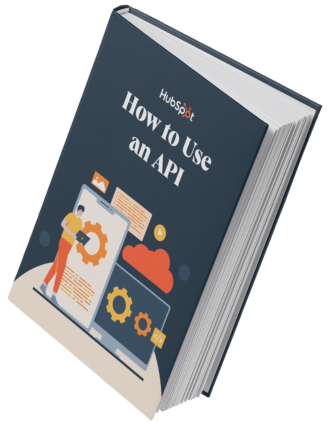I’m not a programmer. Not even close. But I spend most of my days in front of a computer, creating content for brands and businesses. The result? I’m always happy to find something that makes my job easier.
Enter free open APIs. On my end, they let me use functions and features that streamline my work. For application developers, APIs let them provide access to specific services or solutions without exposing internal code.
In this guide, I’ve compiled some of the best free open APIs for marketers and content developers from the following categories:
- Marketing APIs.
- Website APIs.
- Email and Messaging APIs.
- Map APIs.
- News APIs.
- Image and Video APIs.
- Social Media APIs.
- Productivity APIs.
- Design APIs.
- Business APIs.
- File Storage APIs.
- Other open APIs.
Grab your free guide on How to Use an API, and let’s get started!
What is an open API?
Application programming interfaces, or APIs, are intermediaries that relay communication between two programs in a format each respective application can interpret. An open API, also referred to as a public API, is published and freely shared. Once published, an open API can be used by anyone in any way, without organizational interference.

What makes a good open API?
Since open APIs are free to use and readily available to anyone, they’re not always going to be as polished as partner APIs (which are premium services). When I’m browsing for open APIs to use, here are the criteria I use.
1. Documentation
No matter what API I’m working with, poor documentation makes me regret my choice. The best APIs, including those that are free, craft their documentation with care. These documents are also revisited and updated in a timely manner.
That’s why I always skim an API’s documentation before diving in.
See it in practice: If you want to see what that might look like, check out HubSpot’s API reference documentation.
2. Security
Open APIs should, at the very least, employ basic authentication and authorization methods. Usually, this means I’m given a free key to use when making API calls. This prevents my calls from being intercepted and transformed by malicious actors.
3. Simplicity
When it comes to the topic of APIs, “simple” is always a relative term. However, I find a good rule of thumb is that well-designed APIs structure their resources clearly and logically for easy-to-understand requests.
4. Performance
Free APIs may place lower limits on the number of requests allowed within a given period. But I don’t want performance to suffer simply because the API is public.
Slow API performance could hurt the user experience and push users away from my app. If I can’t find a well-performing API that does what I need, I consider paid options.

Free Ebook: How to Use an API
Everything you need to know about the history and use of APIs.
- A History of APIs
- Using APIs
- Understanding API Documentation
- And more!
Download Free
All fields are required.

The Best Free APIs
- HubSpot API
- Yahoo Search Marketing API
- Common Crawl
- Google APIs
- WordPress APIs
- Sejda PDF API
- QRcode Monkey
- Telegram API
- Hunter API
- Mailchimp API
- Mapbox API
- ArcGIS API
- Yelp API
- The New York Times API
- Associated Press API
- News API
- Shutterstock API
- YouTube API
- Vimeo API
- LinkedIn API
- X API
- Facebook API
- Awe.sm
- Place Cats
- APIMeme
- Spotify API
- QuickChart
- Square API
- IFTTT
- NASA
To make your life easier, we’ve rounded up the best free APIs you can use for your projects.
Free Marketing APIs
1. HubSpot API

With the HubSpot API, you can build custom solutions for your business’s marketing, sales, service, and website strategies. You’ll be able to add advanced functionality to an already powerful marketing software. Plus, you can integrate your HubSpot account with other tools.
Pro tip: Pair the HubSpot API with free HubSpot Academy courses to maximize your marketing, sales, and service efforts.
2. Yahoo Search Marketing API

This free API lets you access Yahoo marketing data so you can better manage your marketing campaigns. Tailor your applications to display only the data you need with this well-documented solution.
Pro tip: Use Yahoo as one of multiple marketing data sources to tailor your campaign efforts.
3. Common Crawl

Crawling tools are effective because they can access internet data anonymously. This makes large amounts of data available for analysis and interpretation. Few can do it like Common Crawl, an API service that builds and maintains a repository of data accessible to all.
Pro tip: With so much data available, prioritize target audience characteristics to find applicable marketing and sales information.
Free Website APIs
4. Google APIs

Google offers a wide range of open APIs that make it easier to work with Google’s many products. From Blogger, to AMP, to AdSense, to Maps, many Google services can be integrated via a specialized API.
Pro tip: With so many APIs available, start small and ramp up. Select a few APIs that offer needed functionality rather than trying to do everything at once.
5. WordPress APIs

The WordPress APIs are an ecosystem of tools that can extend WordPress capabilities. They are sorted into categories to help you to find what you need. Developers of plugins and themes will find this to be an especially useful resource.
Pro tip: Review your WordPress site for pages and links that would benefit from targeted APIs.
6. Sejda PDF API

The Sejda PDF API allows you to integrate its PDF tools with your website and fill out PDF forms online. It also lets you streamline communication with others (such as vendors). You can automatically share signed documents or PDF forms they need to fill out.
Your customers can also copy your PDF templates easily.
Pro tip: Despite the evolution of document file formats, PDFs remain a key component of business operations. APIs like Sejda PDF help take the stress out of converting and signing PDF files.
7. QRcode Monkey

The QRcode Monkey API creates custom QR codes to add to your website or application. It’s accessible through RapidAPI.
Pro tip: Do you need a QR code for your business to succeed? No. Do you benefit from a QR code on your site? Absolutely. Use QRcode Monkey to drive increased user engagement.
Free Email APIs and Messaging APIs
8. Telegram API

Telegram is a messaging service with two APIs. The first messaging API is the Bot API, which lets you connect bots to Telegram — allowing you to use the messages as an interface. The second is an API that lets you build your own version of Telegram with full customization of the design.
Pro tip: Telegram is a secure messaging app, making it a great choice if you deal with sensitive business or personal information.
9. Hunter API

The Hunter API allows you to find or verify the email addresses of professionals and companies. It can come in handy if you want to reach people whose contact information isn’t readily available online.
Pro tip: Finding an email is the first part of the equation — make sure you’re sensitive to users who may not want their data found or shared.
10. Mailchimp API

MailChimp has two APIs available for developers: a Marketing API and a Transactional API, along with a rich developer community to support them. Harness these resources to incorporate tailored email deliverability to your application.
Pro tip: Email remains a powerful marketing tool. Use the Mailchimp API to identify key trends in email campaigns including open rates, user actions, and conversions.
Free Map APIs
11. Mapbox API

Mapbox is a leading provider of geolocation data for developers to build custom dynamic apps. It exposes its data through 10 different APIs for different uses. While primarily a paid service, Mapbox has a free plan that allows limited use of its APIs.
Pro tip: I recommending starting with the free plan to see if Mapbox works for you. Better to experiment first than pay for something you won’t use.
12. ArcGIS API

ArcGIS is powerful open-source software for mapping and data visualization. Its free API lets you create informative charts with geographic data displays. This includes both 2D and 3D map displays for impressive and professional-looking visuals.

Free Ebook: How to Use an API
Everything you need to know about the history and use of APIs.
- A History of APIs
- Using APIs
- Understanding API Documentation
- And more!
Download Free
All fields are required.

Pro tip: Data visualization drives understanding. Use ArcGIS to explore visual data formats and then scale up complexity as you get more comfortable.
13. Yelp API

With the Yelp API, you can access review data sorted geographically. You can then filter by ratings and distance from a location. You can use this to improve your local marketing efforts.
Pro tip: I always make sure to account for both positive and negative reviews. While the latter are harder to read, they offer actionable insight to improve your service.
Free News APIs
14. The New York Times API

When you need to know what’s happening around the world, you can use a New York Times API. These APIs can pull any article, list, bestseller, tag, movie review, or other popular shared content for your project.
Pro tip: Context matters in content. The New York Times api can help ensure your blog and social media posts are timely and relevant.
15. Associated Press API

The Associated Press API is similar to the New York Times API — both let you pull articles, lists, and other content directly to your application or webpage.
Pro tip: Use the Associated Press API in conjunction with the New York Times API to get a more comprehensive view of what’s happening in the world.
16. News API

The powerful News API scans tens of thousands of news sources across the web. It then returns relevant content based on your request. This is a handy tool if you want to feature content relevant to your product or industry on your website.
Pro tip: The News API is great for finding content that’s relevant to your specific audience. Combine its data with data from news APIs listed above to create content your audience enjoys.
Free Image and Video APIs
17. Shutterstock API

The Shutterstock API provides access to Shutterstock’s library. This allows you to search, view information, preview, license, and download media. This includes royalty-free images, music tracks, and video clips.
Use it to improve your site’s aesthetics and express your brand better with high-quality media.
Pro tip: I often find that images convey intent more quickly than words. Use the Shutterstock API to help your content stand out.
18. YouTube API

This API helps you add YouTube functionality to your sites and apps. For example, you can use an embedded player in your app, enable users to subscribe in one click, and schedule and manage live broadcasts.
Pro tip: Video is quickly becoming a preferred marketing channel — and no video site is bigger than YouTube. Leverage this API to keep your content relevant.
19. Vimeo API

Vimeo is a popular option for enterprise video hosting. Its API is a great choice when you want to add videos within your app and customize the playback experience. You can also take advantage of Vimeo's video tools.
Pro tip: Vimeo provides more control over the playback experience — use in your app or on your webpage for any videos you create or edit in-house.
Free Social Media APIs
20. LinkedIn API

With this API, you can add LinkedIn functionality to your sites and apps. That includes signing in, sharing on LinkedIn, integrating LinkedIn learning, and extending your marketing efforts to the platform.
Pro tip: I think the LinkedIn API is a great choice for improving the marketing reach of professional services companies or small business owners.
21. X API

The X API helps you read and write X data. This can help build scheduling apps and other productivity functionality. You can also find tweets containing certain keywords, hashtags, or topics.
Pro tip: Need to take the pulse of your community or customer base? Use the X API to get a sense of what’s happening right now.
22. Facebook API

Facebook offers a library of APIs and other developer resources. With this information, you can read and write data from Facebook, Instagram, Messenger, and WhatsApp. You can now monitor and write social media posts. This API can also manage your social media marketing activities.
Pro tip: The multiplatform nature of Meta makes the Facebook API a great choice to connect with customers where they are and where they prefer to interact.
23. Awe.sm

Awe.sm offers several APIs to integrate your social media marketing tools with your website or application. You can also track performance data.
Pro tip: If I want to take a more general approach to social media APIs, Awe.sm is a great choice for improving the scope and scale of social marketing efforts.

Free Ebook: How to Use an API
Everything you need to know about the history and use of APIs.
- A History of APIs
- Using APIs
- Understanding API Documentation
- And more!
Download Free
All fields are required.

Productivity APIs
24. Paraphrase Text API

Creating great content is time-consuming. With the paraphrase API, you can tweak content for use on multiple platforms while keeping its original meaning intact. This is a great way to make content go farther across blogs, social media sites, and marketing campaigns.
Pro tip: As a freelance writer, I can tell you that less is more when it comes to paraphrasing. While tools like the Paraphrase Text API are great for making content go further, don’t overdo it.
25. PDFEndpoint

Got a webpage you need to be converted to PDF? This API has you covered. With just a few lines of code, you can easily convert HTML and URLs directly into PDFs.
Pro tip: Choose the plan that works for you. If you’re only doing a few PDFs every week, the free plan offers 100 conversions per month. For $9 you get 500 per month, and additional conversions are just 4 cents.
26. Vector Express 2.0

Vector files are resolution-independent, which means they can be scaled up or down without losing quality. Vector Express's API lets you easily convert multiple image file types into vectors.
Pro tip: While there is a free option — which I think is worth checking out to see if it meets your needs — it comes with file size limits.
27. PandaDoc

Panda Doc is all about building document workflows that streamline business processes. For example, you can create workflows that automatically create or list contacts listed on documents, or require authentication to access specific files.
Pro tip: With so many features and functions, PandaDoc can be a bit overwhelming. I recommoned starting with the Guides and Tutorials section to get the most from this API.
28. Random User Generator API

The Random User Generator does exactly that — generates random user data that includes names, images, and contact information. This tool is a great way to test marketing or sales applications and ensure they’re collecting the right data from customer contacts or profiles.
Pro tip: The generator is also a great way to train machine learning (ML) algorithms. Give ML tools a host of random user data and see what conclusions it reaches. Then, evaluate these conclusions for accuracy and relevance.
29. SwiftKanban

Kanban is a type of workflow management that focuses on visual elements. Its goal is to simplify the workflow process and is often used to streamline the implementation of agile development processes or the integration of DevOps software.
SwiftKanban makes it easy for companies to implement this approach to workflow management. In addition to creating workflows, SwiftKanban can also measure and improve operations with analytics and feedback.
Pro tip: Use the Quick Start with SwiftKanban guide if you’re unfamiliar with the Kanban process.
Design APIs
30. Unsplash API

Unsplash makes it easy to search for photos, find photos, or list new photos for use. The API includes unlimited requests and is used by more than 25,000 applications. It supports multiple libraries for JavaScript, PHP, and Ruby.
Pro tip: All images are dynamically resizable, and Unsplash is also available as a mobile SDK for both Android and iOS.
31. Colormind

Colormind is a color palette generator that can help you find the ideal color scheme for your website or application. Generate your own palettes or use those provided by Colormind.
Pro tip: The API is free for personal and non-commercial use. If you are planning to use the app for business, contact the developer directly.
32. EmojiHub

EmojiHub lets you get random emojis from already-sorted categories or groups. It’s a great idea for mobile or web apps that involve conversation or reactions — users can quickly pull emojis from the same conceptual category while still getting the fun of a random image.
Pro tip: Along with random emojis, you can also get the whole list of emojis by category. You can also run the API as part of a Docker Container.
33. Word Cloud

Word clouds are a great way to understand word frequency within a given text or around a specific subject. The Word Cloud API lets you quickly create clouds with customized text and output options.
Pro tip: Using Word Cloud, you can include (or exclude) stop words. If included, these stop words will not appear in your Word Cloud, helping you eliminate commonly used words that don’t add specific value.
34. Lordicon

The Loridocon API lets you access thousands of animated icons for your website or application. From minimalist designs to modern options, there’s no shortage of great choices. You can also choose how your icons displays — they can react when users hover over them, morph into other icons, or repeat on a loop.
Pro tip: Lordicon’s free version gives you access to more than 7,000 icons. The for-pay plan offers 21,000 animations and does not require attribution.
35. Icon Horse

Favicons are small, 16x16 icons that appear on web pages or search results. Short for “favorite icon,” they act as shorthand for brand recognition.
Here’s the HubSpot favicon:

It’s simple, familiar, and easy to recognize.
The Icon Horse API lets you search any website address and find its favicon, which you can then add to links, dashboards, or avatars on your webpage.
Pro tip: Icon Horse is a simple that can be used in an img tag to return the highest-quality favicon it can find.

Free Ebook: How to Use an API
Everything you need to know about the history and use of APIs.
- A History of APIs
- Using APIs
- Understanding API Documentation
- And more!
Download Free
All fields are required.

Business APIs
36. Domainsdb.info

Not sure if a domain name is registered? This API makes it easy, letting you search more than 260 million registered domains and 1000 top-level domains. Using the web interface, you can return 50 results, while the API can return up to 100 results.
Pro tip: Along with the API, you can also get the full list of registered domain names returned by your search by submitting a custom request.
37. Markerapi

Looking for a trademark? Use the Marker API to quickly search by serial number, owner, expiration date, or product description. While the API is free to use, it requires that you create an account with Marker to connect it with your application.
Pro tip: If you have less than 1,000 searches per month, you can get the Marker API for free. 10,000 searches are $25 per month, and you can get up to 10 million for $100 per month.
38. Charity Search

Looking for charities to support or partner with? The Charity API lets you quickly search and vet more than 2.5 million charities in the United States and over 85,000 Canadian charities.
Pro tip: Along with the Charity Basic and Charity Premium API, there are also more targeted API options. For example, you can use the Charity GeoLocation API to discover more about where the charity is located, while the Charity Financial API provides data about the organization’s IRS status.
39. Instatus

The Instatus API lets you provide status values for services or applications. Page statues include “UP”, “ALLUNDERMAINTENANCE” or “SOMEMINOROUTAGE.” Component, incident, and maintenance statuses are also available.
Pro tip: Use this API to report on the status of your local services and apps, or to display the status of services that your application leverages to deliver results.
40. Apache Superset

Superset provides a no-code interface to build charts, visualize data, and define custom dimensions. It is a REST API that follows the OpenAPI specification. Its documents are produced using the Swagger React UI.
Pro tip: I would use Superset for everything from charts to CSS templates to dashboards, databases, and datasets.
File Storage and Sharing APIs
41. File.io

The file.io sharing API lets you easily upload and share 2GB worth of files or folders. Made by the minds behind LimeWire — one of the Internet’s first file-sharing services — file.io has the pedigree to back up its promises.
Pro tip: While file.io does have a free plan, it’s worth noting that files are auto-deleted after one download. As a result, it may be worth springing for the Basic plan, which offers 2 TB of permanent storage.
42. Box

Popular file storage and sharing platform Box also offers an API that allows you to connect Box products to your own service or applications. Developers can also use Box AI to improve code and explore documentation.
Pro tip: Need help integrating your Box API into existing apps or services? Check out the Box Developer Community form to ask and answer questions and share resources.
43. Dropbox API

Using Dropbox APIs, you can integrate applications with Dropbox accounts, and develop custom workflows that improve performance. In addition, the Dropbox API includes admin functions for authorization and access control.
Pro tip: Dropbox lets you develop in the language of your choice, including Swift, .NET, Java, JavaScript, Objective-C, and Python.
44. Quip

Quip is an automation API that allows you to automate processes and integrate the Quip development tool with other apps or products. Quip APIs integrate with tools including Salesforce, Slack, Google Workspace, Github, Stripe, Box, and Zendesk to name a few.
Pro tip: All Quip APIs have rate limits to ensure fair user access. The automation API is limited to 50 requests per minute per user and 750 requests per hour per user.
45. Storj

Storj provides global cloud object storage. To achieve this goal, the Storj API makes use of distributed storage nodes worldwide. Utilizing excess storage capacity across global databases creates a reliable, secure network that delivers enterprise-grade performance.
Pro tip: Storj has an active community, which means that if you’ve got a problem chances are someone has an answer. Check out the Storj forum for tips, tricks, and advice.
46. ImgBB

The ImgBB API lets you add image-uploading functionality to apps or services. Users can drag and drop direct image links, BBCode or HTML thumbnails up to 32 MB.
Pro tip: While the ImgBB service is free, access to the API requires an ImgBB Pro account. This also increases your file upload size to 64 MB per image.
Other Free REST APIs
47. Place Cats

Who says work always has to be serious? Place Cats randomly generates amusing pictures of cute cats and kittens. You can use it to improve the mood around your website or simply put a smile on a colleague’s face.
Pro tip: They’re cats. They’re cute, and they’re funny. Enough said.
48. APIMeme

Another fun API is the APIMeme. It lets you generate memes using a simple interface. With over 100 popular meme characters (like Condescending Wonka, Confession Bear, Confused Gandalf, Eminem, and Family Guy Brian), all that’s missing is a dose of your wit.
Pro tip: Great memes can inject a much-needed dose of humor to otherwise dull meetings or emails. It’s never a bad thing to get people laughing.

Free Ebook: How to Use an API
Everything you need to know about the history and use of APIs.
- A History of APIs
- Using APIs
- Understanding API Documentation
- And more!
Download Free
All fields are required.

49. The Movie Database API

Who’s that actor? What were they in? What’s the name of that movie, again? The Movie Database (TMDB) API lets you add movie-query functions to your website, giving users something fun to do while they explore your products or services.
Pro tip: The API is not optimized for mobile. TMDB developers recommend using a desktop and web browser instead.
50. JokeAPI

Sometimes you just need a laugh. That’s what the JokeAPI is for — this REST API serves up well-formatted jokes without the need for registration, payment, or even an API token. It also supports filters to help find the joke(s) that work best for your app or website.
Pro tip: The JokeAPI currently offers 1368 jokes from 6 languages. If you’ve got a joke you want to add, you can fill out the JokeAPI submission form.
51. Spotify API

Does music play an important role on your website or application? Spotify’s open API allows developers to freely utilize Spotify song, album, artist, and playlist data. The API can also add songs to playlists and control music playback.
Pro tip: Finding the right music can set the mood for your site or app. Spotify helps you pick the perfect track.
52. QuickChart

Use QuickChart to quickly generate chart and graph images that you can embed in email, chatbots, and SMS. It uses Chart.js, a robust open-source charting library. You can create a simple chart with a single URL. For more sophisticated charts, use the POST request.
Pro tip: Charts are great way to visualize data — adding them to chatbots with QuickChart is a great way to improve customer service.
53. Square API

Although all three are payment gateways, Square is unlike Stripe and PayPal. Rather than just letting customers send you payments, it lets you customize the payment gateway itself.
You can create gateways for your mobile app, website, and even your physical point-of-sale system. This improves the checkout process and user experience in general. Note that, while the API is free, Square charges a processing fee for all transactions.
Pro tip: The easier it is for customers to pay, the better. Square lets you create payment portals that reflect your business and streamline the payment process.
54. IFTTT

IFTTT makes it possible to make your applications and devices work together by using simple “if this, then that” criteria. This means that one action is triggered by another as defined by you. For instance, you can set a photo or blog post to be shared across all platforms whenever it’s posted on one platform.
Pro tip: Use IFTTT to automate key tasks such as scheduling and posting so your team can concentrate on new marketing or sales campaigns.
55. NASA

Through the NASA Open Data Portal, you can access NASA’s data on natural phenomena, both terrestrial and beyond. Particularly of use are its climate and weather data, as well as its visualizations.
Pro tip: Sometimes, you just need a picture of the galaxy. Take your app or site to the next level with NASA’s Open Data Portal.
Getting Started with APIs
After putting this list of 55 opens APIs together, I can honestly say I am impressed by the wealth of (free!) resources out there for marketers and content developers.
I recommend combing through the list to find the APIs that will service your business needs best. Then, leverage them to boost the impact and streamline the process of creating your next project, campaign, blog post, or website.
Editor's note: This post was originally published in March 2020 and has been updated for comprehensiveness.

Free Ebook: How to Use an API
Everything you need to know about the history and use of APIs.
- A History of APIs
- Using APIs
- Understanding API Documentation
- And more!
Download Free
All fields are required.




![How to get a YouTube API key [tutorial + examples]](https://53.fs1.hubspotusercontent-na1.net/hubfs/53/%5BUse%20(1)-4.webp)






